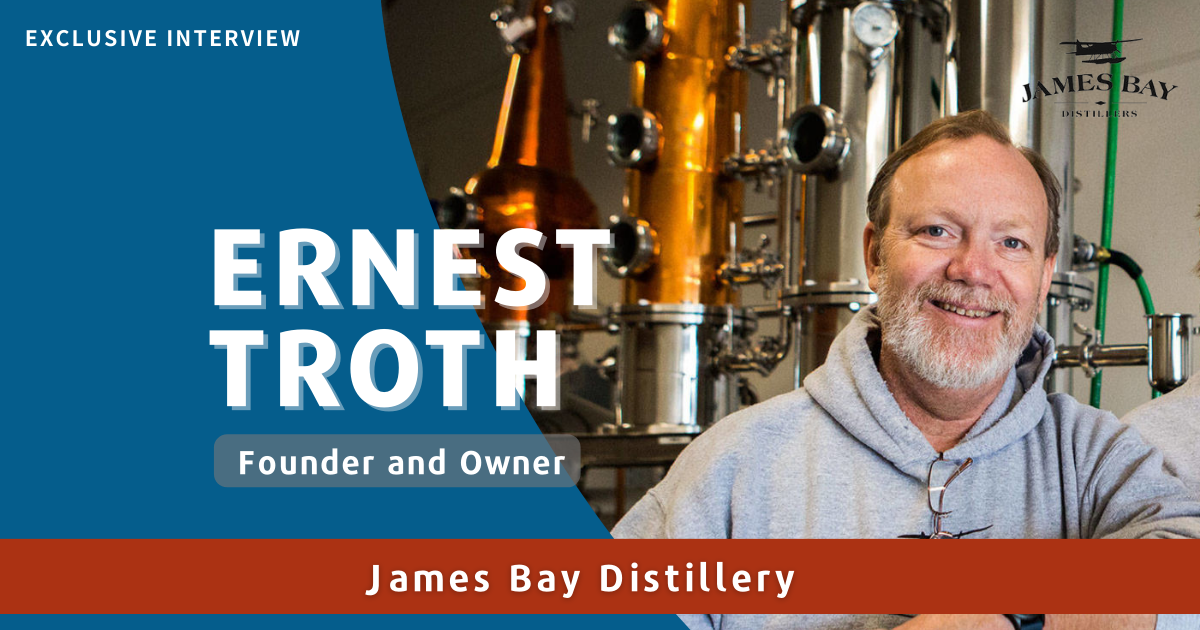
【Exclusive Interview】Ernest Troth – James Bay Distillers
- 造り手
- 蒸溜所(海外)
 アイキャッチ231009-1.png)
When you think of a “whisky-maker,” you probably picture distillers and bottlers. However, coopers, who are the fundamental backbone of whisky production, are often overlooked. In Glasgow, there is the last independent and family-run cooperage left in Scotland: Fisher Cooperage, where industry giants like Chivas Regal and Beam Suntory turn for cask repairs. Dear WHSKY visited Fishers Cooperage to talk with the founder George McGhee and his son Graham. So, who truly resides at the heart of “whisky-making”? Let’s find out.
【Cooperage Visit】Fishers Cooperage – Behind the Scenes (coming soon!)
Founded in 1998 by George McGhee in Glasgow, Fishers Cooperage stands as the last independent cooperage in Scotland. George, along with his wife Mary and their children Graham and Susan, have managed the repair of various casks. They supply not only to Scotland but also extending their services beyond.
| Company | Fishers Cooperage Ltd. |
| Location | 357 Shettleston Rd, Glasgow G31 5JL, UK |
| Year of Establishment | 1998 |
| Contact | fisherscooperage@btconnect.com |
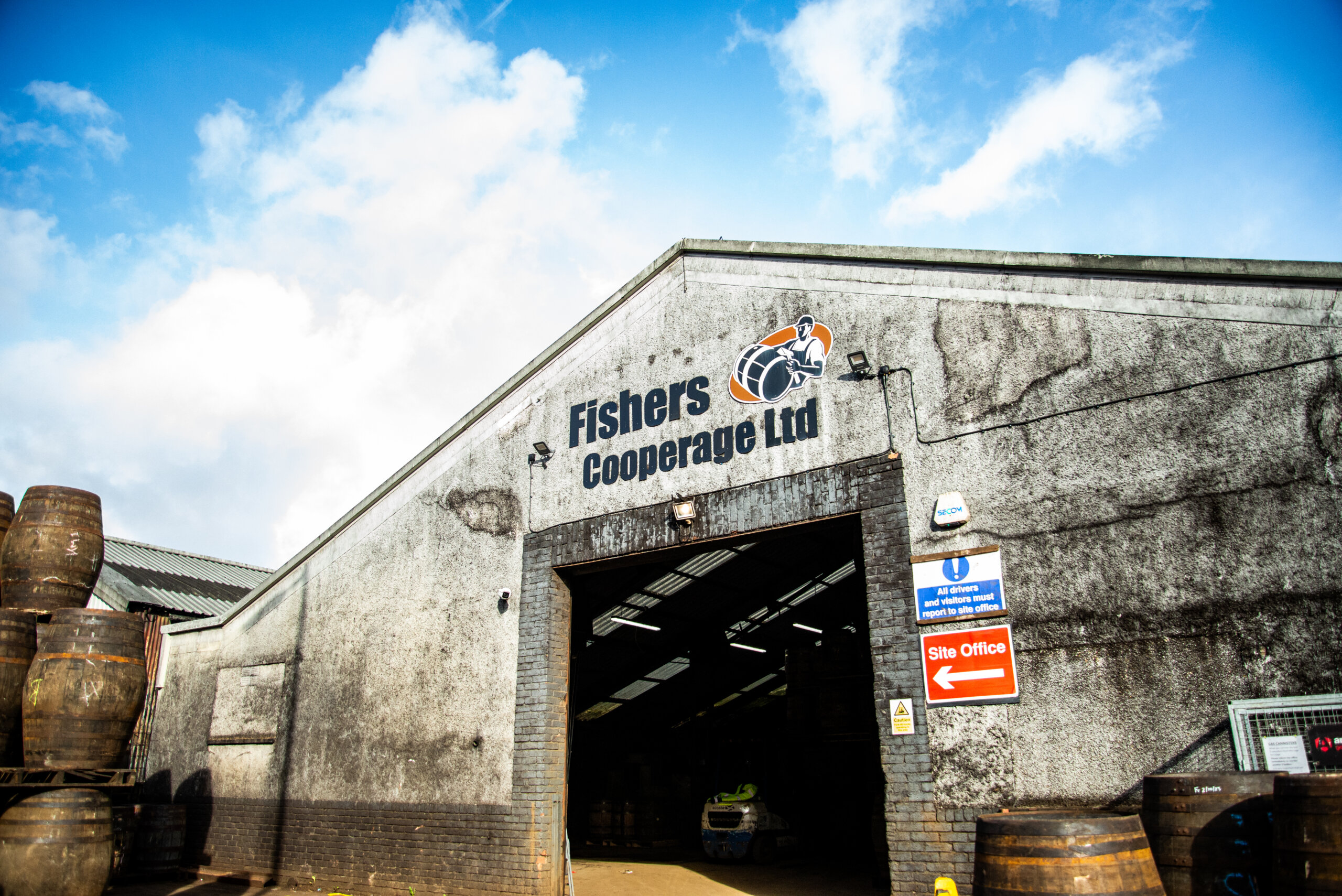
Fishers Cooperage in Glasgow
Introducing George McGhee, the visionary behind Fishers Cooperage. In an industry dominated by corporate giants, George not only founded but also thrived in establishing Fishers Cooperage as a vital player in Scotland’s cooperage landscape. With a noteworthy stint as President of the National Cooperage Association, George later passed on the business to his son, Graham McGhee. Graham, a former football player for a Scottish team, now leads the cooperage alongside his sister Susan, driving it forward amid the unprecedented demand in the Scotch whisky industry.
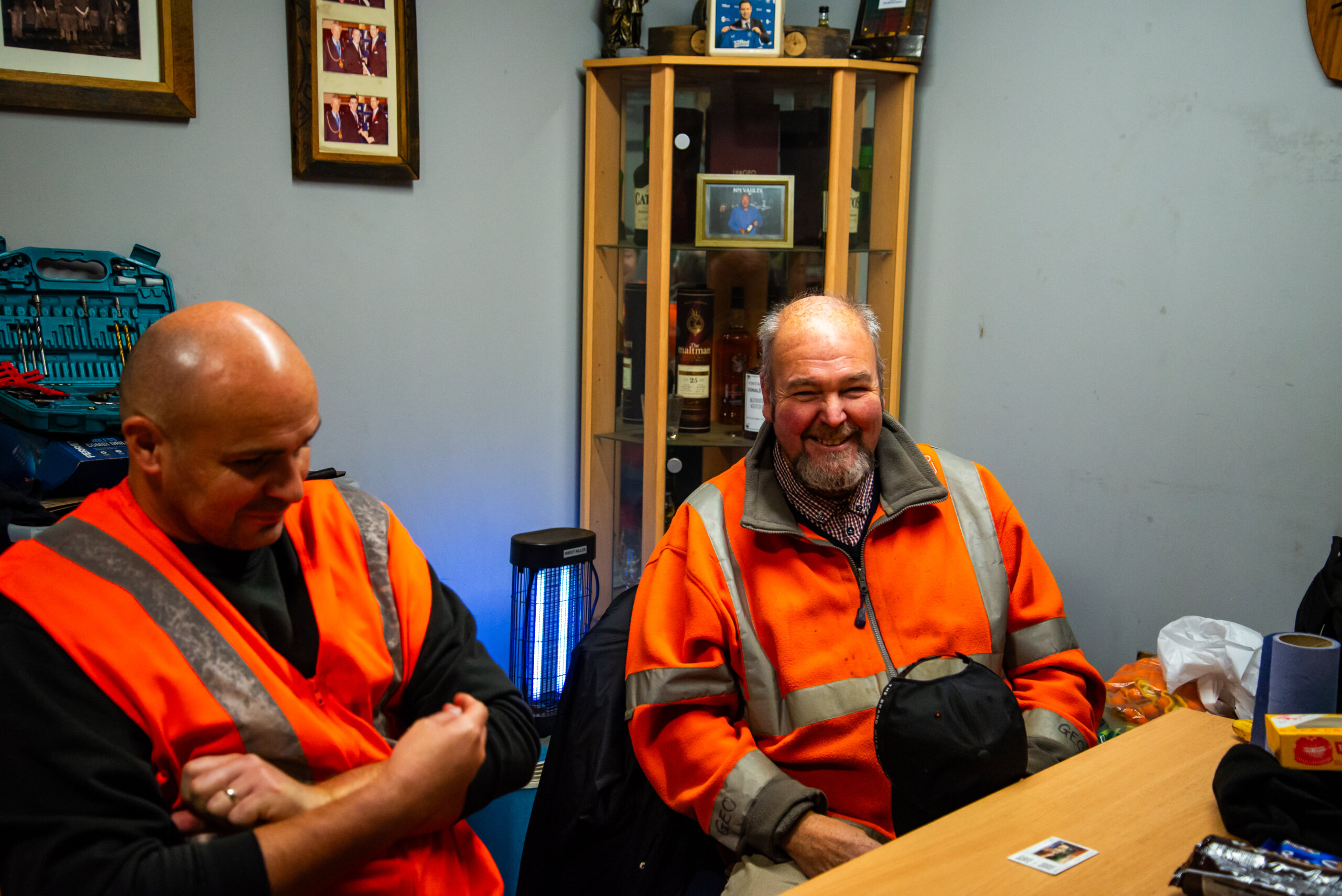
Graham and George in their office
Dear WHISKY:
How and when did you enter the coopers’ world?
George:
I’ve been a cooper since 1970, and what led me into coopering was my family background; I was born in a family of coopers. My uncle and two older brothers were coopers before me, making me the third in line. Soon after, my four younger brothers also chose to become coopers.
Dear WHISKY:
Is it common in Scotland for people to become coopers over several generations?
Graham:
Yes. Many of our staff here share these familial connections too.
Dear WHISKY:
How about you, Graham?
Graham:
I used to play football at the Scottish National Team, and the idea of becoming a cooper never crossed my mind. However, I was always familiar with the world of cooperage as I grew up hearing stories about it since childhood. When I faced challenges in my playing career, I reconsidered my path and entered Fishers Cooperage. In 2015, when my father had a heart attack, I made a decision to step in and take over our family business.
Dear WHISKY:
Was there a particular point that affected your career as a cooper?
George:
In the 1980s, there was a period when people stopped drinking whisky, and distilleries ceased whisky production. Every warehouse was filled with whisky that they couldn’t sell, and coopers like me had no work.
Dear WHISKY:
What did you do during the hard time?
George:
For 11 years, I tried many different jobs, such as driving lorries and bakers’ bans or working in the railway industry. I also traveled abroad, where I took up painting boats. Eventually, I was picked up again and returned to the cooperage.
Dear WHISKY:
How and when did you start your company “Fishers Cooperage”?
George:
Before me, there was an old man who owned a cooperage named “James Fisher and Son.” I used to work there for quite a long time, and when Mr. Fisher, the owner, aged, I took over the ownership in 1998.
Dear WHISKY:
Is that where the name “Fishers Cooperage” comes from?
George:
Exactly. When I purchased the company, I made a promise to him to preserve the legacy, and I kept their name, renaming it “Fishers Cooperage.”
Dear WHISKY:
What changes have the company experienced since 1998?
George:
The previous owner kept the business quite small, but I’ve expanded it. Currently, our facility is at full capacity with a team of 25 people. With the increasing order of repairing casks, we need more space and staff. So, we’re now searching for a new location to take the next step.
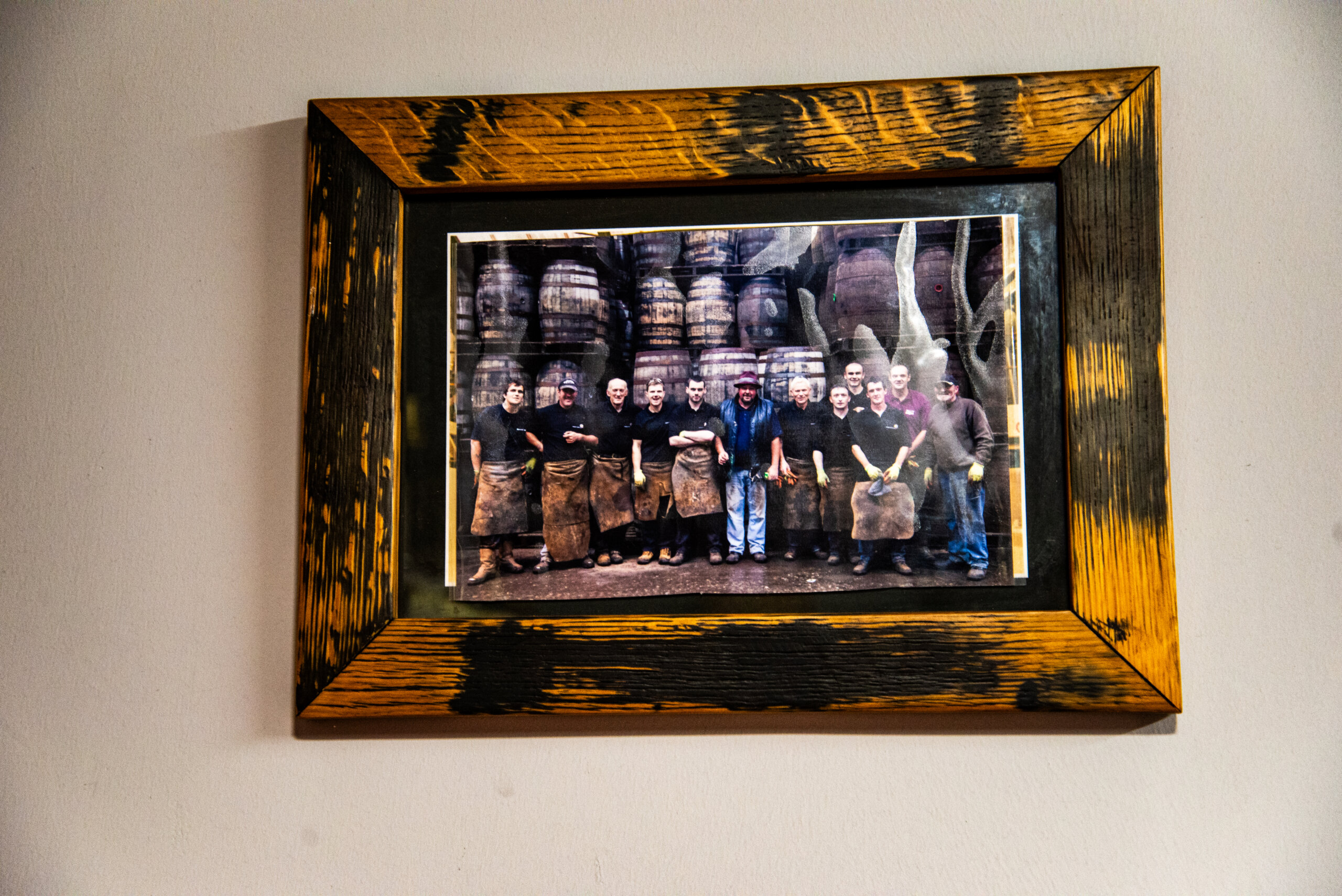
The members of Fishers Cooperage
Dear WHISKY:
Since Fishers Cooperage was founded, what challenges have you faced, and how did you overcome them?
George:
For us, it took ten years to truly establish ourselves. The first ten years were tough – some weeks, we barely had enough to pay our staff, but we stayed focused on what we do. I can’t pinpoint any specific thing we did during that time, but one day, everything just started working out.
Dear WHISKY:
How do you reflect on those ten years?
George:
While difficult to define, that period was a learning process for me. Ten years was the timeframe needed to gain customers’ trust and build good relationships with partners and organizations.
Dear WHISKY:
How does Fishers Cooperage operate?
George:
We are the only remaining independent cooperage in Scotland, and we operate as a family-run business. Founded by myself, our team includes my wife May, and my children, Graham and Susan. Even though some big corporations have wanted to buy our cooperage, we’re happy the way we are. We like being a close-knit family business and managing everything ourselves.

George, Susan, and Graham in front of Fishers Cooperage
Dear WHISKY:
What makes Fishers Cooperage distinct from other cooperages?
Graham:
I would say we’re a good cask repair shop. In Scotland, you’ll find various cooperages, each with its unique specializations. While some focus on crafting new casks, repairing casks is our expertise.
Dear WHISKY:
What do you mean by “repairing casks”?
Graham:
When casks finish their maturation process—whether it’s three, ten, or twelve years—people turn to us for repairing and maintaining the casks before being filled again. Although our business is not the biggest within the cooperage industry, we’re good at what we do.
Dear WHISKY:
How many casks do you repair in one day?
Graham:
Depending on the cask types, we handle between 100 and 400 casks a day. Larger casks take more time, such as sherry butts with 500L capacity. Every week, almost 3,000 casks come in and out our facility.
Dear WHISKY:
What kind of casks are you working with?
Graham:
Mostly whisky, but sometimes rum, wine, etc. Although some never work with big casks like sherry butts, as bigger is more difficult, we do any type. Nowadays, everybody wants something different. So we receive various orders.
Dear WHISKY:
How long is the whole process of cask repairing?
Graham:
The process, from disassembly, examination, and replacement, to reassembly, may take five minutes for one cask and up to 45 minutes for another. The time varies depending on the issues with the casks, as well as size and people’s proficiency.
Dear WHISKY:
Is there any particular difference between a whisky cask and other casks?
Graham:
Whisky casks can take different sizes like barrels (200L), hogsheads (300L), and butts (500L). They’re used-casks, having filled other spirits before being used for maturing whisky. However, the main difference is the type of wood. The regulation specifies that whisky must mature in oak casks, which can be made from white oak, common oak, or any type of oak tree.
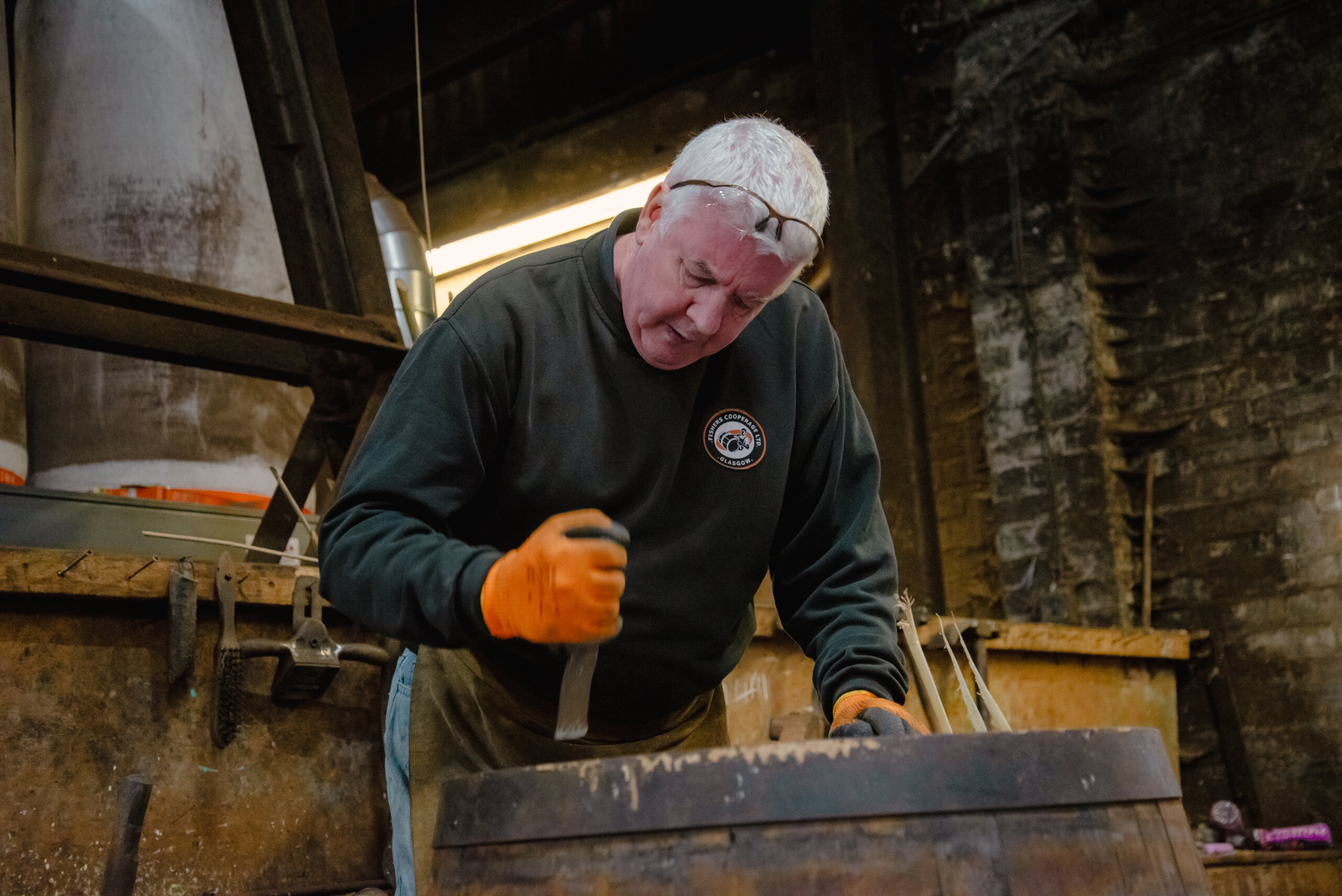
Phillip, an experienced educator of young coopers
Dear WHISKY:
How many people are currently working at Fishers Cooperage?
Graham:
We are 25 people right now. Most of them live nearby, and usually from this area in Scotland.
Dear WHISKY:
When are your coopers working?
Graham:
Monday to Friday, normally 7:30 am until 4 pm.
Dear WHISKY:
How does the work system operate?
Graham:
Here, the staff are paid for each cask they work on. Everyone handles the whole process on their own, without division of labor. Once someone completes the repairing of a cask, it’s recorded. This system allows us to track daily production and who made each one.
Dear WHISKY:
How do people normally find a cooper’s job?
Graham:
At Fishers Cooperage, people normally reach us through family connections. Nonetheless, our job opportunities are open to everyone.
Dear WHISKY:
What kind of people normally apply for cooper?
Graham:
Oftentimes, we get young people reaching out, but there’s no age restriction. While not everyone is a whisky fan, many coopers do enjoy it.
Dear WHISKY:
Who are you working with?
George:
We are partnered with large corporations such as Beam Suntory, Chivas Regal, and Diageo, as well as working with many small distilleries. While the majority of our orders come from the UK, we also repair casks for companies abroad, including Japan.
Dear WHISKY:
How did you manage to establish such strong partnerships?
George:
These corporations found us, hearing about our strong reputation in cask repair. In addition, we sometimes collaborate in other areas, such as conducting cask-repairing demonstrations at their events.
Dear WHISKY:
How do you get an order?
George:
People contact us via call or email, telling us what they need and delivering casks here. Once the casks are repaired, they are delivered back to them. On a weekly basis, we plan the tasks and make the timelines for repairing and shipping the casks at our office next to the factory.
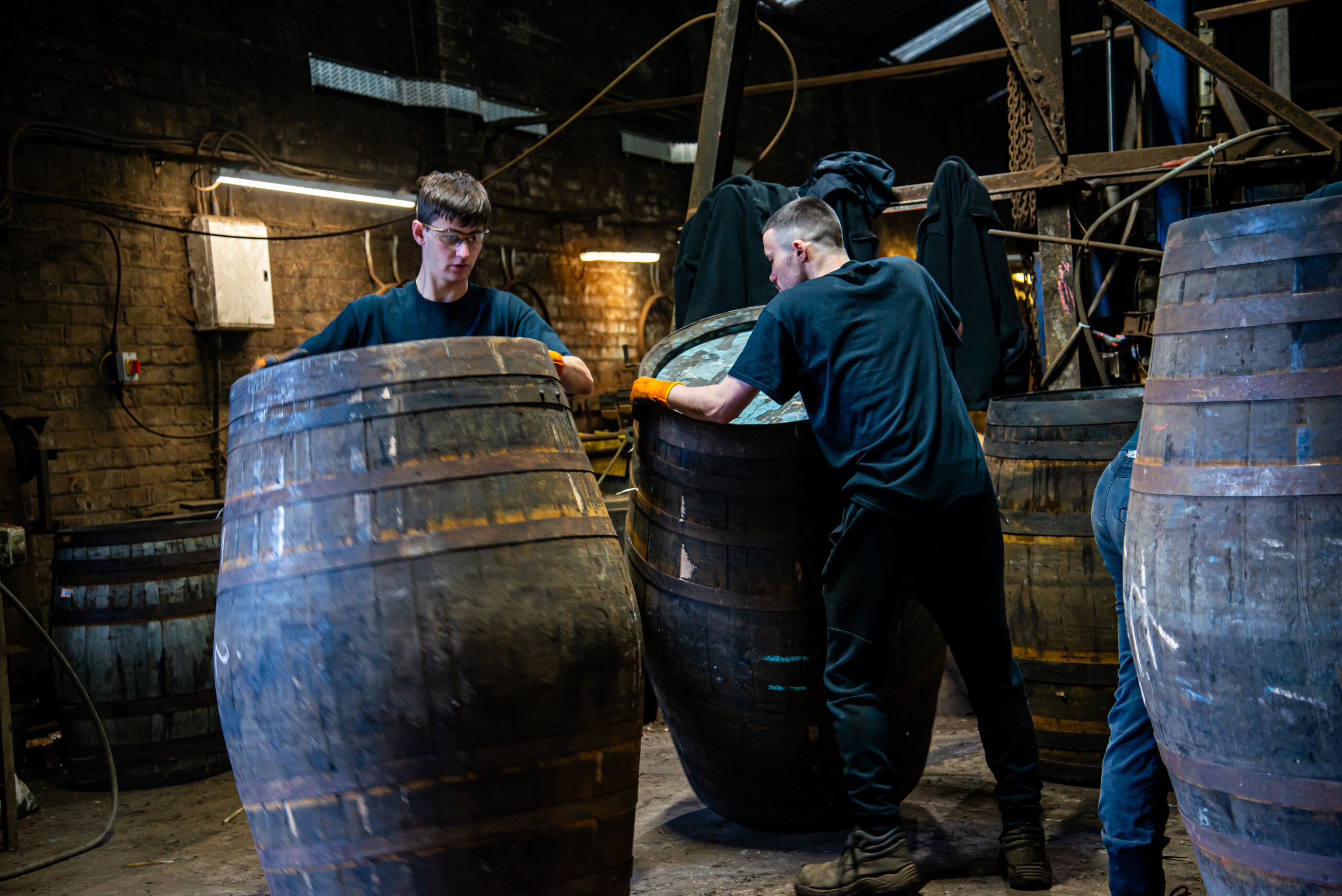
Cask-repairing process
Dear WHISKY:
You’re the past President of the National Cooperage Federation.
What are the roles of the federation?
George:
The National Cooperage Federation, covering Scotland, England, and Ireland, has been uniting coopering professionals for over 100 years. Through regular council meetings every two or three months and an annual gathering, the federation provides a forum for employers to discuss coopering-related matters.
Dear WHISKY:
How is the Fishers Cooperage involved in the National Cooperage Federation?
George:
Graham or I attend regular meetings to exchange insights. Additionally, people come to our cooperage to test the trainees. I also sometimes go to other cooperage to do the same.
Dear WHISKY:
What are the essential traits for coopers?
George:
I would say, to have the right attitude and be consistently reliable. This means showing up every day, being on time, waking up in the morning, getting ready, and heading to work. While it might sound very simple, keeping this routine over the years is not an easy task. I did it throughout my entire life, and it brought me to where I am now.
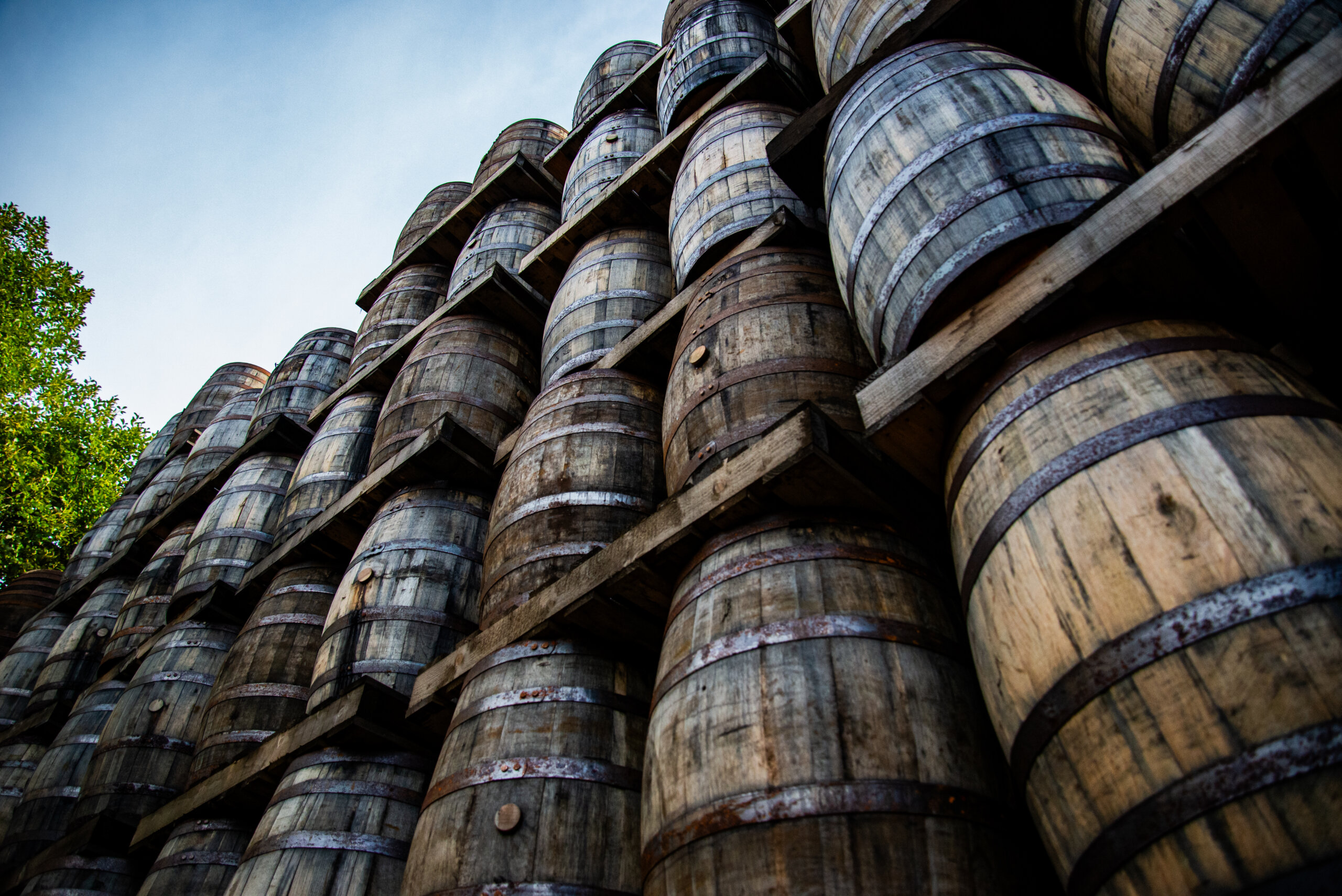
Backyard of Fishers Cooperage
Dear WHISKY:
What challenges is the cooperage industry facing today?
George:
The demand for casks is overwhelmingly enormous. It used to be a cycle of extreme busyness followed by quiet periods. However, for the last ten years, it’s been like busy, busy, busy…almost non-stop.
Dear WHISKY:
What makes coopers so busy?
George:
It’s all because of the growing popularity of whiskies. The demand keeps rising, and our clients often tell us, “We need more.” Usually, major blended whisky corporations plan for a 12-year production cycle, but the demand consistently surpasses the expected output.
Graham:
Another challenge is the shortage of staff. We need more young people who are reliable and responsible. Although you can make a good living if you have a strong work ethic, working as a cooper is hard; it’s manual, technical, and demanding. This is a common problem in cooperages over Scotland.
Dear WHISKY:
What’s the relationship between coopers and the whisky industry like?
George:
It’s straightforward. When whisky gains popularity, the cooperage business expands. Conversely, during quieter periods in the whisky industry, we’re not as busy.
Dear WHISKY:
How do you view the role of coopers in the whisky industry?
George:
Coopers are the foundation of the whisky industry. When you look at the industry, all you see is the people who make whisky, bottle whisky, and sell whisky. But coopers are always there, paying a crucial, bottom part. Without coopers, none of it would be possible. I believe that coopers should be respected and recognized more for the excellent job they do, and they should be higher up the ladder in the industry.
Dear WHISKY:
What accomplishment in your career are you most proud of?
George:
I took a big risk and climbed to this point. We started from scratch, and when the previous owner retired, everyone thought Fishers Cooperage was over. However, I kept going. Some were unhappy because they wanted to take over our orders, and there were times at coopers’ meetings when nobody would talk to me. But now, we’re well-established, capable of competing with anyone in Scotland. I even held the position of President at the National Coopers’ Federation. I wish my late family could see where we are today.
Dear WHISKY:
What’s your next goal?
George:
In the next ten years, our goal is to expand our business with more staff, more orders, and more space – overall, everything will see growth.
Graham:
For me, I’ll carry on what my father built up alongside my sister Susan and our staff. It’s a lot of work, but I’ll give it my best and push ahead.
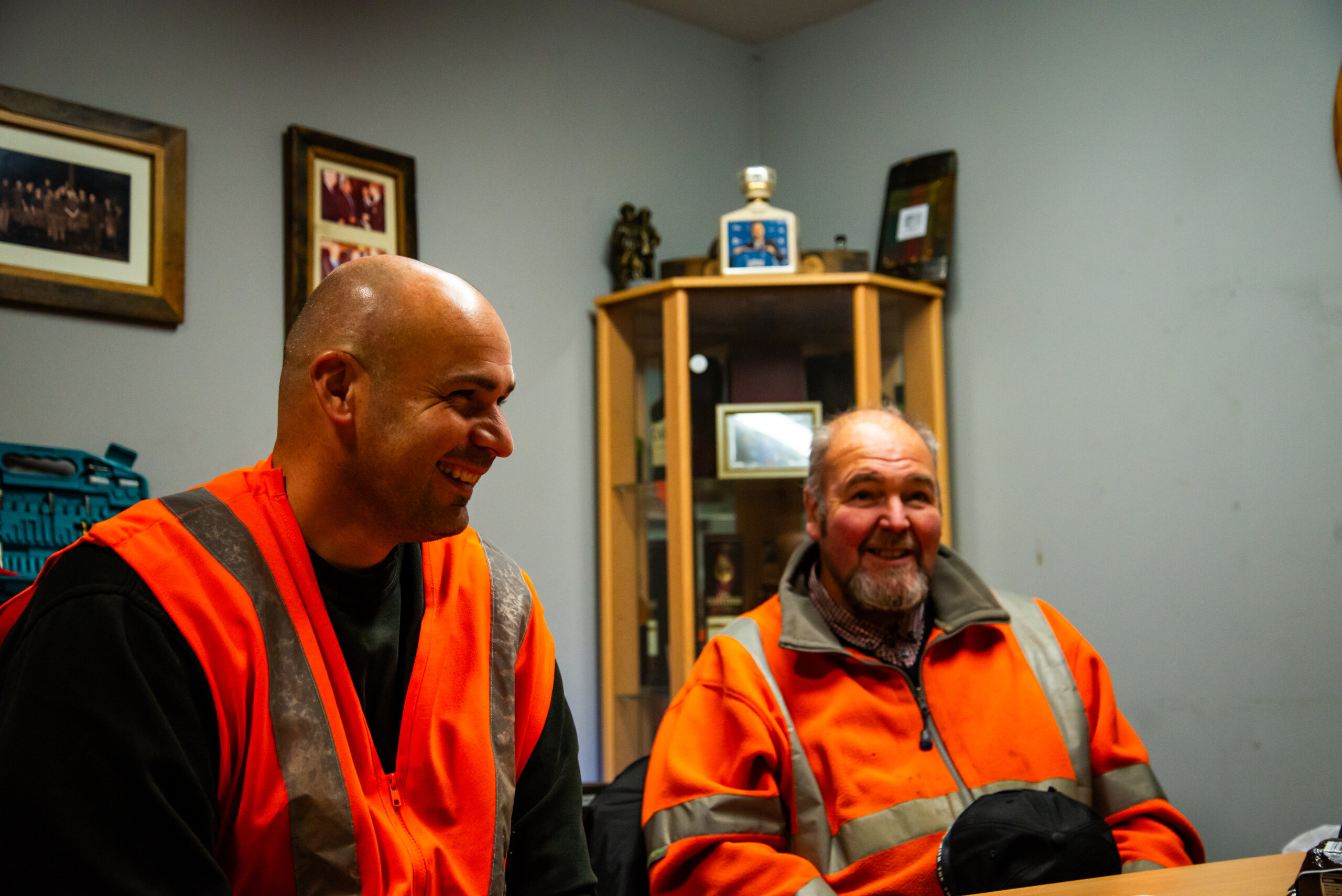
Graham and George talk about their path and future
George says, “If you’re a cooper, nobody would tell you that you’re doing a great job. People come to you only when there’s an issue with the casks you made”. This highlights the longstanding commitment of Scottish coopers to perfection. Despite the small recognition, coopers stand as the true backbone of the whisky industry.
The whisky in your glass might have matured in a cask from Fishers Cooperage. The next time you enjoy a dram, please take a moment to appreciate the dedication of these craftsmen. For those who wish to master the art of coopering, feel free to contact: fisherscooperage@btconnect.com. Fishers Cooperage warmly welcomes new members.
【Cooperage Visit】Fishers Cooperage – Behind the Scenes (coming soon!)